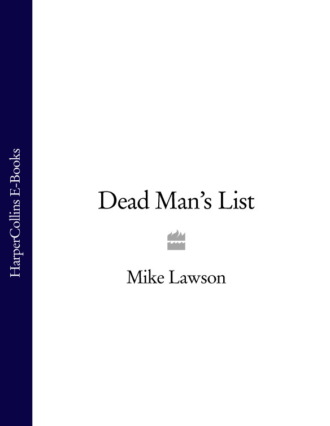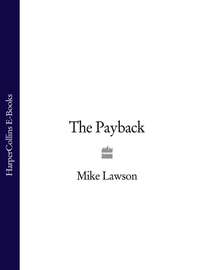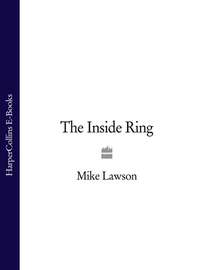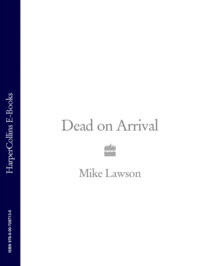
Полная версия
Dead Man’s List

Dead Man’s List
Mike Lawson

To Gail—for everything—forever.
Table of Contents
Cover Page
Title Page
Prologue
Chapter 1
Chapter 2
Chapter 3
Chapter 4
Chapter 5
Chapter 6
Chapter 7
Chapter 8
Chapter 9
Chapter 10
Chapter 11
Chapter 12
Chapter 13
Chapter 14
Chapter 15
Chapter 16
Chapter 17
Chapter 18
Chapter 19
Chapter 20
Chapter 21
Chapter 22
Chapter 23
Chapter 24
Chapter 25
Chapter 26
Chapter 27
Chapter 28
Chapter 29
Chapter 30
Chapter 31
Chapter 32
Chapter 33
Chapter 34
Chapter 35
Chapter 36
Chapter 37
Chapter 38
Chapter 39
Chapter 40
Chapter 41
Chapter 42
Chapter 43
Chapter 44
Chapter 45
Chapter 46
Chapter 47
Chapter 48
Chapter 49
Chapter 50
Chapter 51
Chapter 52
Chapter 53
Chapter 54
Chapter 55
Chapter 56
Chapter 57
Chapter 58
Chapter 59
Chapter 60
Chapter 61
Chapter 62
Chapter 63
Chapter 64
Chapter 65
Chapter 66
Chapter 67
Chapter 68
Chapter 69
Acknowledgments
About the Author
Praise
Also by Mike Lawson
Copyright
About the Publisher
Prologue
“Carl, goddamnit, don’t bruise his neck!”
“I’m trying not to, but he’s a strong little bastard.”
“Shit, you’re twice his size. Grab him by the hair, not the neck.”
“That did it,” Carl said after a minute. “I just saw a buncha bubbles come out.”
“Yeah, well, hold him there a while. I don’t want what happened in that movie.”
“Movie?”
“You know, the one with what’s-her-name, where she boils the rabbit.”
“Oh, yeah. But what’s that—”
“At the end there, don’t you remember? When Douglas gets her in the tub? Bubbles comin’ outta her mouth, eyes wide open, then like five minutes later the bitch pops up and tries to stab him.”
“I don’t remember that part,” Carl said. “I remember the rabbit but…”
“Oh, for Christ’s sake,” Jimmy said. “Just hold him there.”
“You got his keys?” Carl said.
“Yeah, I got the keys,” Jimmy said. “What do you think I’m jigglin’ here?”
Jimmy opened the door which led into the kitchen of the house. “Now where’s his office, den, whatever?” He started through the kitchen but stopped when he heard the refrigerator door open. “What the hell are you doing?”
“Gettin’ a Coke,” Carl said. “I’m thirsty.”
“Are you nuts?”
“I’m wearin’ gloves. What’s the big deal?”
Jimmy just shook his head. Carl, sometimes he just didn’t know.
Two minutes later, they were standing in front of the safe. It had been behind a picture, a sailing scene.
“Why do they always put it behind a picture?” Carl said. “I mean, you know where it’s gonna be.”
“They put it behind a picture because it’d look pretty fuckin’ ugly, just sittin’ there in the middle of the wall,” Jimmy said.
“Oh.”
Jimmy spun the lock on the safe.
“How the hell did Eddie get the combination, anyway?” Carl said.
“He said something about a locksmith the guy used.”
Jimmy swung open the door to the safe. Inside it were a bunch of little notebooks, the covers doodled on, the pages all ragged. Jimmy took out the notebooks, several at a time, and tossed them into his shoulder bag. Carl had said that the shoulder bag looked like a faggy purse, which it sort of did, but it was better than carrying around a shopping bag.
At the back of the safe was a wad of cash bound with a rubber band. Jimmy flipped through it. Maybe five grand. The guy’s disaster money. He handed the cash to Carl and looked back into the safe. The only thing remaining, lying flat on the bottom, was a clear plastic sheet with little pockets containing coins. Jimmy didn’t know anything about old coins but he figured these must be worth something or the guy wouldn’t have put them in his safe—but he didn’t touch the coin holder.
“That’s it,” he said, but then he noticed something under the coin holder. He lifted up the plastic and saw a flash drive for a computer. “Damn,” he muttered, “almost missed that.” He put the flash drive into his bag.
“Gimme the money.” Carl handed him the cash and Jimmy tossed it back into the safe and closed and locked the door. Eddie had said not to take any money, or anything else but the stuff he’d told them. And if that’s what Eddie said…
“Now let’s find his laptop,” Jimmy said. “And any more of these flash thingamajigs.”
Carl finished the Coke he was drinking, made a small burp, and put the soda can in Jimmy’s man-purse.
“Okey-dokey,” Carl said.
Chapter 1
Mahoney was reclining near the pool, a big blue beach umbrella shading his head. His meaty right hand was wrapped around a frosted glass containing equal parts vodka and tomato juice. Clenched in his left hand, in the V created by two thick fingers, was a cigar. He wore white swim trunks with a red stripe down the side, and partially covering his broad chest and substantial gut, was an unbuttoned aloha shirt patterned with red hibiscuses. His hair was white and full, his legs were white, thick, and hairless, and his large bare feet were pale.
DeMarco thought he looked like a beluga whale that had crashed a luau.
“It’s about time you got here,” Mahoney said.
This complaint was typical of Mahoney. There he was—lying under an umbrella, drinking, doing nothing—while DeMarco had been forced to drive seventy miles in heavy traffic because his boss hadn’t wanted to talk over the phone. Or maybe Mahoney just didn’t want to hold the phone as this could have interrupted his drinking and smoking.
Nor did Mahoney offer DeMarco a seat or a drink. This breach of etiquette could have occurred because Mahoney was oblivious to the creature comforts of his subordinates—or it could have been because DeMarco looked impervious to such ailments as dehydration and heat stroke. DeMarco’s forefathers were Italian and his features reflected his heritage. He was five foot eleven, with heavy shoulders and strong arms. He combed his dark hair straight back, and the first strands of gray were just beginning to appear at the temples. He had a handsome face, but a hard one, and if Francis Ford Coppola had been casting extras for Godfather IV, he would have hired DeMarco on the spot.
So DeMarco stood there in front of Mahoney’s lounge chair, squinting into the midday sun. It was the first of September and the temperature was in the low eighties. As he waited for Mahoney to tell him why he’d been summoned, he glanced up at the large house in the background. DeMarco didn’t know who had loaned his boss the use of the mansion with its pool and its magnificent view of Chesapeake Bay, but he suspected it was someone trying to curry his favor. DeMarco wondered if that same person had loaned Mahoney the woman he could see in the window.
The woman—lithe and tanned—was in her thirties and she was walking back and forth in front of a large picture window, talking on a cell phone. The only thing she was wearing was a black bikini bottom the size of a stripper’s g-string. Her bare breasts, from a distance of fifty yards, were flawless.
Mahoney swiveled his thick neck to see what DeMarco was looking at.
“Yeah, she’s a character,” he said. “And in case you’re havin’ impure thoughts, she’s not with me. She’s the girlfriend of the guy who owns the house.”
Impure thoughts—a Catholic sinner’s expression—and DeMarco bet that Mahoney had been confessing to that particular transgression from the time he was a pudgy altar boy. But was he lying about the woman? DeMarco didn’t know. He doubted if God knew. And the fact that Mahoney could lie so nimbly was not surprising: he was a politician. John Fitzpatrick Mahoney was the Speaker of the United States House of Representatives, third in line for the Oval Office if both the president and vice president were unable to serve. A truly terrifying thought in DeMarco’s opinion.
“Hey! Stop looking at her tits and pay attention,” Mahoney said.
DeMarco reluctantly shifted his gaze back to Mahoney’s blue eyes—the red-veined eyes of a dedicated drinker.
“There’s a guy,” Mahoney said, “an old buddy of mine, an ex-congressman from Virginia. His name’s Dick Finley and he retired about ten years ago. Anyway, a week ago his son died in some kinda weird accident and Dick wants somebody to look into it.”
“Does he need a lawyer?” DeMarco asked. “I mean is he planning to sue somebody?”
DeMarco had asked the question not because he cared about the answer but because he had just looked up at the mansion again—and he wanted to keep looking. The young woman was still on the phone, but this time she saw DeMarco staring at her. She turned to face him so he was treated to a full-frontal view, and then she smiled and wiggled her fingers at him. She was so firm nothing else wiggled. He bet Mahoney was lying.
Mahoney snorted in response to DeMarco’s question. “If he needed a lawyer, Joe, I wouldn’t have given him your name.”
DeMarco was offended though he knew he had no right to be. He had a law degree—had even passed the Virginia bar—but he had never practiced law. He was too busy doing other unsavory things on Mahoney’s behalf.
“It sounds like what he needs,” Mahoney said, “is somebody to turn over a few rocks and see what crawls out.”
There you go, DeMarco thought. That was his job description: rock flipper and bug crusher. Not very flattering but accurate enough.
Chapter 2
Retired congressman Richard Finley lived in Colonial Beach, Virginia, not far from the Chesapeake Bay mansion where DeMarco had met Mahoney.
Finley answered the doorbell wearing a sun-faded red golf shirt, khaki pants, and scuffed Top-Siders. He was short, in his eighties, bald and tanned, and had the kind of neat round head and small-featured face that looked good without hair on top. He smiled at DeMarco when DeMarco introduced himself but the smile didn’t reach his eyes. Finley’s eyes looked hollow and haunted, as if he’d been punched in the gut by fate one too many times.
He led DeMarco onto a deck that looked out over the beach, said how much he appreciated DeMarco coming, and asked if he wanted a beer. As Finley was popping the tops on two Coronas, DeMarco commented on the view.
Finley glanced over his shoulder at the water as if he’d forgotten it was there. “Yeah,” he said, “I bought this place for my wife and kids to come in the summer. And for my grandkids if I ever had any, which I never did. Now my family’s all dead so I guess I’ll just donate the place to some charity when I’m gone.”
DeMarco almost screamed: No! Give it to me! But instead he nodded his head solemnly.
“My wife, breast cancer killed her, and my other boy, he died in Vietnam—God curse John Kennedy for that. And now my youngest son is dead. We had Terry when I was forty-one. I never thought for a minute that I’d outlive him.”
“I’m sorry,” DeMarco said.
“But with my wife and my oldest boy, at least I knew why they died. With Terry, I don’t know what happened. And that’s why I called John, to see if he knew somebody who could…I don’t know, poke into things.”
Dick Finley explained that his son, Terry, had been a reporter for the Washington Post and two days ago his body had been found in Lake Anna where Terry had a home.
“They said he’d been out in his kayak and had fallen overboard and drowned. But the story doesn’t make sense.”
“You don’t think he drowned?” DeMarco said.
“He drowned,” Dick Finley said. “The autopsy was definitive on that. And the water they found in his lungs came from the lake.”
“Then I don’t understand,” DeMarco said.
“It’s a long commute from D.C. to Lake Anna, and Terry was a workaholic. The day he died, I know he left the Post about eight, so he wouldn’t have gotten to the lake until at least nine-thirty. So why would a guy go kayaking at nine-thirty, ten o’clock at night? I asked the police that, and they said there was a full moon that night, but I still don’t buy it. And the other thing is, Terry got that kayak five, six years ago. He was always getting interested in some new thing—biking, kayaking, rock climbing—and then after a couple of months he’d lose interest. The only thing he cared about was work. What I’m saying is, I don’t think Terry’d been in that boat in two or three years, maybe longer.”
“But his body was found in the lake, near the kayak,” DeMarco said.
“Yeah, but there’s other stuff. Like Terry’s laptop is missing. That laptop was always with him. If he wasn’t carrying the thing, it was close by—in his car, on his desk, wherever he was. I asked the sheriff where his computer was, and at first he said he didn’t know. Two days later he calls back and says that Terry had filed a report with the D.C. cops before his death saying it had been stolen.”
“And you don’t think it was?”
“No. I talked to Terry the day he died, that morning. If his laptop had been stolen, he would have told me. He’d have been going nuts to find it. And the sheriff said that Terry reported the theft over the phone, not in person. So who knows who really filed the report?”
“I see,” DeMarco said.
“And that’s not all,” Finley said. “Terry was working on something, something he said was going to win him a Pulitzer. He wouldn’t tell me what, but he said when he filed his story the dome was gonna come off the Capitol. Now to tell you the truth, I didn’t think too much of that. Terry was always working on some story he said was gonna be big, but usually wasn’t. But then he goes and dies, and now I don’t know. You want another beer?”
While Finley was getting his beer, DeMarco looked down at the beach and noticed a pudgy, middle-aged man walking a small dog. He watched as the guy tossed a stick of driftwood into the water. The stick looked heavy and was as long as the dog, but the dog—poor, dumb creature that it was—charged into the water after it. A wave crashed into the animal and it disappeared for a moment, then it reappeared with the stick in its mouth. The dog fought its way back to the beach and brought the stick to the man, who immediately tossed it again, farther out this time. DeMarco felt like going down to the beach and throwing the stick into the water and making the pudgy guy go fetch it.
After Finley handed him his beer, DeMarco said, “Do you think there might be something in your son’s house that would give me an idea of what he was working on?”
“Maybe you can find something, but I looked a couple days ago,” Finley said. “I went all through his desk, even looked in his safe to see if he’d put something there, but all that was in the safe was some cash and some old coins he’d collected.” Finley smiled then, but it was a sad smile. “The coins were like the kayak,” he said. “Terry bought ‘em ten years ago and probably hadn’t looked at ‘em since then. But if you want to look in his house, I’ll give you the keys.”
“That’d be good,” DeMarco said. “I’ll take a look later if I think I need to.”
“I did find one thing that I can’t explain,” Finley said, and he reached into his shirt pocket and carefully removed a wrinkled piece of paper and handed it to DeMarco. The paper was water-damaged and torn. It was a cocktail napkin from a place called Sam and Harry’s, a bar in D.C. that DeMarco went to quite often.
“That was in Terry’s wallet,” Finley said. “His wallet was in his pants when he died and it got wet, of course. All the cash and credit card slips were all stuck together and I tore that when I tried to separate it from the other stuff. That’s all of it I could salvage.”
DeMarco studied what was written on the napkin for a moment but could make no sense of it. “You think what’s written here might be related to whatever he was working on?” he said.
“I don’t know,” Finley said. “It looks like he was just doodling on that napkin—Terry was a real doodler—but I don’t think he would have put it in his wallet if it wasn’t important. Look, the only thing I know for sure is that he didn’t fall out of a damn kayak at ten o’clock at night.”
Chapter 3
“Old man Finley’s a good guy,” the sheriff said. “I liked him when he was in Congress and I still like him. But he’s wrong about Terry. There wasn’t anything suspicious about his death.”
The Louisa County sheriff was in his forties, well-muscled and tanned, and on the credenza behind his desk was a picture of him and a boys’ baseball team. Two of the kids in the picture were clutching a good-sized trophy. DeMarco hoped the sheriff was as good a cop as he was a coach.
“We didn’t find any signs of a struggle,” the sheriff said. “His house wasn’t ransacked and he definitely drowned in the lake. The lake’s got some kind of algae in it which is pretty distinctive, and the medical examiner found it in his lungs.”
“You don’t think it’s strange that he was kayaking in the dark?” DeMarco said.
“It wasn’t that dark. There was a full moon that night and the lights from other houses on the lake would have provided more light. But there’s something else, something we didn’t tell Mr. Finley.”
“What’s that?”
“Terry’s blood alcohol level was .18 at the time of his death. We think he had a few drinks after work, came home with a pretty good buzz on, and decided to go for a little moonlight paddle. Drunks have bad judgment. And their coordination and sense of balance aren’t too good either. Have you ever been in a kayak, Mr. DeMarco?”
“No. Been in a canoe, but not a kayak.”
“Well, sometime you oughta try to get in one. What I’m saying is, the toughest part of kayaking is getting in and out of the damn boat without tipping it over, and if you don’t believe me, try it. Then try it again after four drinks.”
DeMarco called the Washington Post and spent five frustrating minutes navigating his way through a particularly annoying voice mail system before he was finally connected to Reggie Harmon’s phone.
“Reggie, my man,” DeMarco said, “I’m in the mood to buy you a big salad for lunch.”
“A salad?” Reggie said, as if he couldn’t imagine consuming something so horrible.
“That’s right, Reginald. A two-olive salad with martini dressing. Onions if you prefer.”
“Ah, that kinda salad. Well, veggies are one of your four basic food groups, aren’t they?”
“Yes, they are, my friend. Plus vodka’s usually made from potatoes. Carbohydrates, you know. And if you have a twist in your second martini, you’ll ward off scurvy.”
“Where and when, son? A man my age can’t afford to ignore his health.”
“The Monocle. As soon as you can get there.”
DeMarco hung up the phone. He should have been ashamed of himself, appealing to the late-morning cravings of an alcoholic to get information—but he wasn’t.
DeMarco had called Reggie from his office, a small windowless room in the subbasement of the Capitol that seemed to have been designed to induce claustrophobia. He spent as little time there as possible, and the décor—or the lack of it—reflected this. The only furniture in the room was his desk, two wooden chairs, and a battered, four-drawer file cabinet. The file cabinet was a totally unnecessary item because DeMarco didn’t believe in keeping written records; they could subpoena him, but not his files. At one point he’d had a couple of pictures on one wall that had been given to him by his ex-wife, but since they had reminded him of her unfaithful nature every time he looked at them, he’d finally taken them down. The pathetic part was that the bare space on the wall where the pictures had been still reminded him of her.
The Monocle Bar and Grill was located near Union Station, less than a fifteen-minute walk from the Capitol. DeMarco locked his office door and walked up the steps to the main floor of the building, to the rotunda, the space directly beneath the dome. He saw a page he knew leading a tour group: a smart-assed, jug-eared little bastard named Mullen. Pages had the professional longevity of butterflies, here one summer and gone the next, so DeMarco rarely knew their names—but he knew Mullen’s. He had walked out of his office one day and saw Mullen smooching a girl page out in the hall, next to his door. Instead of acting embarrassed as he should have, Mullen had the balls to offer DeMarco fifty bucks for the use of his office. The kid would probably be president one day.
To reach the Monocle, DeMarco walked down First Street, past the Supreme Court. He looked up, as he always did, at the words EQUAL JUSTICE UNDER LAW carved into the stone above the building’s sixteen massive marble columns. The high court was one of the few institutions in Washington that DeMarco still had any faith in, and he had this faith for a simple reason: the nine people who worked there had nothing more to gain. They were at the pinnacle of their profession, they had the job for life, and they didn’t have to please anybody to keep the job. Those, he believed, were circumstances that tended to produce honest if not always wise decisions. But he was probably wrong about that too.
As DeMarco stepped inside the Monocle, the maître d’ glanced over at him to see if his attire was appropriate, nodded curtly, then returned to his reservation list. The Monocle was a bit pretentious but then this was understandable: its clientele tended to be the legislative branch of government as opposed to the electorate, and the walls of the bar were covered with photographs of drinking politicians. It seemed like Mahoney was in half the pictures.
DeMarco saw Reggie Harmon sitting at the end of the bar, the only customer at eleven in the morning, his first martini half-gone. Reggie was sixty and he looked like a vampire that had been caught in a sunbeam. He had a pale sunken-cheeked face and dyed black hair plastered to a long, narrow skull. His shirt was two sizes too large around the collar and his thin fingers poked beyond the cuffs like claws.
As DeMarco sat down on the stool next to him, Reggie slowly swiveled his head in DeMarco’s direction. His eyes were so red that DeMarco wondered if any of the reporter’s blood reached his brain. Exposing too many nicotine-stained teeth in the grimace he called a smile, Reggie said, “What do you call a hundred lawyers buried in a landfill?”





